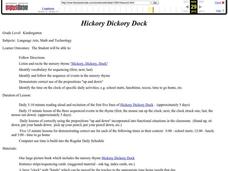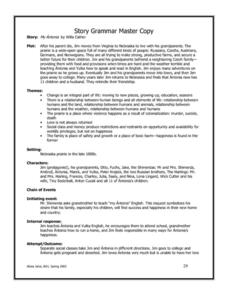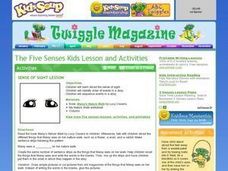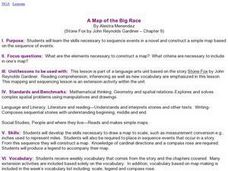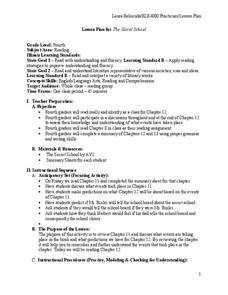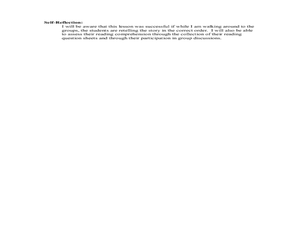Curated OER
Sequence of Events Storyline
Seventh graders practice sequencing the events in a story they have read. After reading a short story, 7th graders sequence the events of the story using a timeline. Their timeline is used to create a summary paragraph of the story...
Curated OER
Hickory Dickory Dock
Students use the Hickory Dickory Dock nursery rhyme to learn about rhyme, telling time, and preposition use. In this nursery rhyme lesson, students read the nursery rhyme daily and complete a Mother Goose quiz. Students sequence the...
Curated OER
Beginning and End
Are you working onevent sequence in your kindergarten class? Use a reading activity to have your kids discuss events from the story, and put them in order. They then cut and paste them in the correct order. A great project for any story!
Curated OER
A Taste of Blackberries
Fourth graders participate in a shared reading of Doris Buchanan's, A Taste of Blackberries. They read about grief in the loss of a best friend and examine the skills of a responsible family member.
Curated OER
Story Building: Nasreddin and the Beggar
In this story building worksheet, students build a story by choosing one of three sentences, using context clues to put the events of the story in order.
Curated OER
Joyful Noise: Poems for Two Voices by Paul Fleischman
Do your young readers know that poems can be performed as a team? They listen to a few examples from Paul Fleischman's book Joyful Noise: Poems for Two Voices, paying attention to how the how readers work together. They examine the...
Curated OER
Some Days Are Like That!
Second graders engage in an activity of reading a story and have a discussion about the story to measure comprehension. The use of a graphic organizer helps student retention because it is brain compatible for students.
Curated OER
My Antonia: Story Grammar
Pupils can write down all of the major plot elements of My Antonia by Willa Cather on this straightforward worksheet. Learners note down themes, characters, the chain of events, and more.
Weebly
Ancient China
From China's physical geography and earliest beginnings of civilization to the Qin and Han dynasties, here is a nicely designed worksheet on ancient China, which includes a graphic organizer and timeline to summarize the reading material.
Council for Economic Education
Wages and the Black Death
While the Black Death wiped out a third of Europe's population during the Middle Ages, its destruction paved the way for better wages for workers and even an early form of modern capitalism. The relationship between the cataclysmic event...
PBS
Booker T. Washington: Orator, Teacher, and Advisor
Imagine teaching yourself to read and write—do you think you could do it? Scholars analyze how Booker T. Washington went from a slave learning to read to a leading educator in the United States. Using video clips, speeches, and primary...
Curated OER
Sense of Sight Lesson
Students sequence what they saw in the book Maisy's Nature Walk. In this sequencing lesson plan, the teacher reads the book and the children listen and observe. Once the book is read, the students have to sequence what Maisy saw on her...
Curated OER
There Was an Old Lady Who Swallowed a Fly
Fourth graders examine the new vocabulary associated with the book, There Was an Old Lady Who Swallowed a Fly before listening to a teacher read aloud of the book. They complete a choral reading of the story, sequence it, and write...
Curated OER
Friendly Neighbors
Students identify the sequence of events in a text. In this literacy lesson, students read the book Miss Tizzy and sequence the events from the text. Students reflect and write about the philanthropic acts in the book.
Curated OER
Story Boards
Students devise story boards to sequence the main events in a story. They draw a picture that demonstrates the main event in each chapter of a story and label it with a sentence.
Curated OER
A Map of the Big Race
Students read a novel and practice putting the events into the correct sequence. Using the text, they create a map showing the events of the race in order and a legend. They must use vocabulary from previous chapters and make their map...
Curated OER
Social Studies: Personal Chronology
Fourth graders draw ten significant events from their lives on index cards, shuffle them, and trade sets with other students. Their classmates try to place them in chronological order. Next, 4th graders tape their index cards next to...
Curated OER
Getting Down and Dirty: An Exploration of the 1930's
Pupils complete an exploration of the 1930s. Using artwork and primary source documents, they compare, contrast and identify cause and effect relationships in the events of the decade. They discover how the events then affect people...
Curated OER
Story Quilts-For the Classroom
Students create a classroom story quilt. In this literacy lesson, students recall events from a text and illustrate their favorite part of the story on a quilt piece. The quilt is sewn together to form a classroom quilt.
Curated OER
My Family and Other Animals: Larry's Idea
For this my family and other animals: Larry's Idea worksheet, student answer 22 questions about the story, Larry's Idea, match characters, put events in order, and rewrite sentences.
Curated OER
The Secret School
Fourth graders read THe Secret School. In this language arts instructional activity, 4th graders make predictions prior to reading and discussing the story. Students write a summary of the chapter.
Curated OER
The Little Hungry Caterpillar
Students discuss "The Little Hungry Caterpillar." In this reading comprehension lesson plan, students make sock caterpillars used in retelling the story so as sequence the events accurately.
Curated OER
Eensy Weensy Spider Lesson Plan
Students create their own versions of The Eensy-Weensy Spider. In this creative writing instructional activity, students read The Eensy-Weensy Spider and imagine what else the spider could do. Students then draw a picture depicting the...
Curated OER
The Secret School-Chapter 4
Fourth graders read The Secret School. In this language arts lesson, 4th graders discuss the characters in the story and read aloud using fluency while reading. Students write a summary of the chapter.



